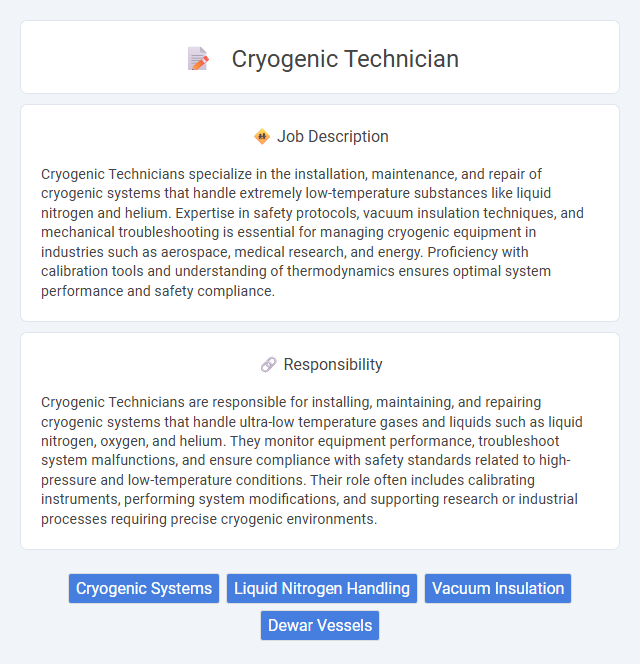
Cryogenic Technicians specialize in the installation, maintenance, and repair of cryogenic systems that handle extremely low-temperature substances like liquid nitrogen and helium. Expertise in safety protocols, vacuum insulation techniques, and mechanical troubleshooting is essential for managing cryogenic equipment in industries such as aerospace, medical research, and energy. Proficiency with calibration tools and understanding of thermodynamics ensures optimal system performance and safety compliance.
Individuals with strong attention to detail and comfort working in extremely cold environments are likely suitable for a Cryogenic Technician role. People who possess good problem-solving skills and can handle the physical demands of maintaining cryogenic systems might adapt well to this job. Those sensitive to cold or uncomfortable with high-pressure equipment may find this career less suitable.
Qualification
Cryogenic Technicians require specialized training in cryogenics, often including certification in handling liquefied gases such as liquid nitrogen and helium. A strong foundation in HVAC, mechanical systems, or industrial technology, paired with knowledge of safety protocols and instrumentation, is essential for maintaining cryogenic equipment effectively. Proficiency in troubleshooting cryogenic refrigeration cycles and experience with pressure vessels or vacuum insulation enhances job performance and qualification.
Responsibility
Cryogenic Technicians are responsible for installing, maintaining, and repairing cryogenic systems that handle ultra-low temperature gases and liquids such as liquid nitrogen, oxygen, and helium. They monitor equipment performance, troubleshoot system malfunctions, and ensure compliance with safety standards related to high-pressure and low-temperature conditions. Their role often includes calibrating instruments, performing system modifications, and supporting research or industrial processes requiring precise cryogenic environments.
Benefit
Cryogenic Technicians may experience significant benefits such as competitive salaries and opportunities for career advancement within specialized fields like aerospace or medical industries. There is a probability of gaining valuable hands-on experience with cutting-edge cryogenic technologies, enhancing technical skills and employability. Job stability might be more likely in sectors that rely heavily on cryogenics, such as energy and research institutions.
Challenge
A Cryogenic Technician likely faces the challenge of maintaining and repairing equipment that operates at extremely low temperatures, requiring precise attention to detail and adherence to stringent safety protocols. There is a probable difficulty in troubleshooting complex systems where even minor errors can lead to significant operational failures or safety hazards. Working in this field may also demand adaptability to evolving technologies and continuous learning to handle advanced cryogenic applications effectively.
Career Advancement
Cryogenic Technicians specializing in low-temperature systems can advance their careers by gaining expertise in advanced cryogenic system design and maintenance, often progressing to senior technician or engineering roles. Pursuing certifications in cryogenics and related fields such as HVAC or refrigeration enhances job prospects and eligibility for supervisory positions. Opportunities also exist in research and development sectors, where technicians contribute to innovations in superconductivity and aerospace applications.
Key Terms
Cryogenic Systems
Cryogenic technicians specialize in the installation, maintenance, and repair of cryogenic systems that operate at extremely low temperatures, often below -150degC. These systems are crucial for applications in medical storage, aerospace, and industrial gas production, requiring precise calibration and safety adherence. Expertise in handling liquefied gases such as nitrogen, oxygen, and helium ensures optimal system performance and prevents thermal hazards.
Liquid Nitrogen Handling
Cryogenic Technicians specializing in liquid nitrogen handling operate and maintain equipment designed for the safe storage, transfer, and application of liquid nitrogen at temperatures below -196degC. They ensure compliance with safety protocols, monitor pressure and temperature levels, and manage potential hazards such as frostbite and asphyxiation risks. Expertise in vacuum insulation systems, cryogenic valves, and emergency response techniques is essential for preventing accidents and ensuring operational efficiency.
Vacuum Insulation
Cryogenic technicians specializing in vacuum insulation maintain and repair advanced vacuum systems that minimize thermal conductivity in cryogenic storage and transfer equipment. Their expertise ensures optimal performance and energy efficiency in maintaining ultra-low temperatures critical for liquefied gases like nitrogen, helium, and oxygen. Precision in vacuum integrity testing and insulation layer application is essential to prevent heat transfer and preserve cryogenic fluid stability.
Dewar Vessels
Cryogenic Technicians specialize in handling and maintaining Dewar vessels, essential for safely storing and transporting liquefied gases like liquid nitrogen and helium at extremely low temperatures. Expertise in monitoring pressure, temperature, and insulation integrity ensures the Dewar vessels operate efficiently and prevent hazardous leaks. Proficiency in routine inspections, repairs, and compliance with safety standards is critical for preserving the vessel's performance and protecting both personnel and sensitive cryogenic materials.
 kuljobs.com
kuljobs.com